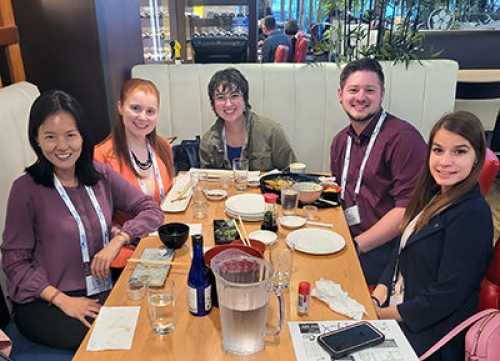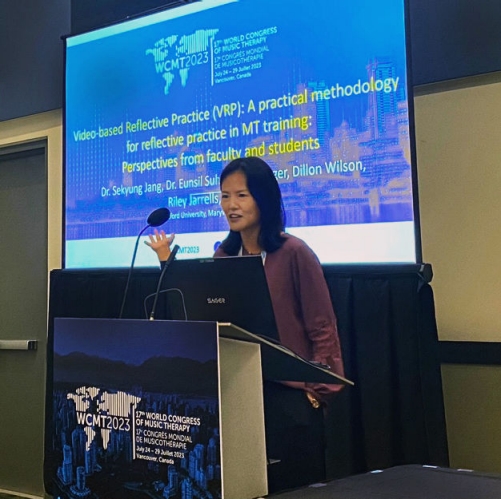Music Therapy Professor and Students Reflect to Refine

How do you know you are getting better at something? How do you know where you need improvement? How do you find your baseline?
That’s a problem that students preparing for a career face every day, and one that Dr. Sekyung Jang has thought a lot about.
Jang is an Associate Professor and Director of Music Therapy at Radford University. She saw that some of her students, while talented and devoted, did not have a good grasp of the way others perceived them or their level of musical mastery.
“Sometimes I see students who have poor self-awareness,” Jang explained. “They have no idea what they do in sessions and sometimes they have no idea what I'm talking about when I give them feedback.”
Jang first encountered this issue as a graduate student teacher at the University of Kansas. It was there that she first started developing her system known as Video-based Reflective Practice, or VRP.
It began with a student who was struggling in clinicals. In clinical course work, students learn to apply their musicianship, knowledge and interpersonal skills to real world situations simulating the kinds of work they will do once they graduate.
Jang said she felt her job was to provide tools for the student, but to really help, she needed the student to see what was happening. Recording the student’s practices on video became part of that solution.
The reflection process begins with students watching a video of their interaction with a client and completing a questionnaire. They are asked to consider their goals, methods, client responses, their responses to the client and what worked and what did not.
The final question is perhaps the most important: “If you were to do this again, what would you change?”
Once that has been completed, the session is reviewed during a supervision meeting. The professor, who attends these sessions in person, can now constructively discuss the student’s work and solve clinical problems together.
In this way, both student and professor can observe strengths and weaknesses and discuss strategies for improvement. Through this process, Jang said, they can develop self-awareness critical for effective practice.
“The object is to help them become better professionals so that when they leave their education, they can deal with their clients better and they can succeed,” said Jang.
Jang has found that many students don’t realize the non-verbal cues they send out until they see it themselves. Similarly, they can be unaware of what they say in a session and how that affects communication and therapeutic efficiency.
“For example, our students are in their early twenties and they say, ‘cool’ all the time,” Jang noted.
“But it may not work for people who are in nursing homes or hospice settings, and they need to find a better way to validate their client responses.”
For students, the process works in two phases, reviewing their practice once around the mid-point of the term and once again near the end. This allows them to identify both improvements and areas that still need work.
After several years of refining the technique and observing its benefits, Dr. Jang published “Video-based Reflective Practice (VRP): A Practical Methodology for Reflective Practice in Music Therapy Training and Clinical Supervision” in the professional journal, Voices: A World Forum for Music Therapy.
In the article, she explains the methodology and how it supports students and supervisors with practical guidelines, may facilitate student growth, and provides a framework for developing clinical skills.

She also presented her research last year at the World Congress of Music Therapy conference in Vancouver, Canada. Four Radford students also participated in the presentation, graduate student Grace Pfleger and undergraduates Dillon Wilson, Riley Jarrells, and Anddy Lee.
Jarrells said the process was eye-opening and effective, and taught her the value of taking a step back for self-evaluation.
“I learned through self-observations that I was often so worried that I was going to mess up that I missed a potential therapeutic moment with the client,” Jarrells said.
“From that point forward, I have made an active effort to focus on the client. This has led to deeper client-therapist relationships where I can better assess what the client wants or needs in each moment.”
Wilson said the conference experience was valuable in other ways as well.
“While at the conference, I was able to talk with professionals from all over the world and attend their research sessions,” Wilson said.
“I was able to travel to a new country, present at the international level, and am now going to attend graduate school with some of the professors I met at the conference,” he noted.